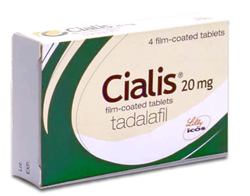
If Sanofi ($SNY) and Eli Lilly ($LLY) have their way, men wouldn't need to ask their doctors to prescribe an erectile dysfunction remedy. They'd simply drive to the drugstore. And that could keep Cialis, one of Lilly's most successful products, on the list of top moneymakers after its patent expires.
Sanofi snapped up over-the-counter rights to Cialis in the U.S., Europe, Canada and Australia, the companies said in a statement Wednesday. Terms of the deal weren't disclosed. But in picking Sanofi, Lilly gets an OTC partner with plenty of experience converting prescription remedies to OTC status--most recently Allegra, its allergy fighter. Plus, thanks to Sanofi's 2010 buyout of Chattem, and similar deals elsewhere, the company's consumer drugs unit boasts a broad distribution network around the globe.
And it's a good time to ask the FDA to allow a drug to be sold without a prescription. The agency is on record saying that it wants patients to have easier access to some drugs, and over-the-counter sales could help. The agency has even toyed with new mechanisms for drug sales, such as kiosks that can screen patients and direct them to suitable meds.
But the Cialis conversion is far from a slam dunk. Even with its new openness to OTC sales, the FDA has been selective in its approvals. Pfizer's ($PFE) attempt to get its statin giant Lipitor into the OTC club have fallen flat, at least so far; the agency has questioned whether a., patients can determine whether they're really suited for statin therapy, and b., patients would understand the potential risks without a doctor's help.
Cialis isn't without its risks. Erectile dysfunction drugs work by relaxing arterial walls. Obviously, that can have overall effects on the cardiovascular system, including lowering blood pressure, which can be a problem for men taking a range of other meds.
Also, Cialis and its rivals bear cautionary language about other risks, such as prolonged erections and a range of drug interactions. Men buying the drug retail might not read side-effect disclosures closely--and might not know what to do if certain side effects crop up. Plus, impotence can be a sign of other health problems, which could go unnoticed if men sidestep their doctors to buy a remedy.
Not to mention the fact that men who don't really need ED meds have been known to use them anyway. As The Wall Street Journal points out, Pfizer tried to switch Viagra to OTC status in Europe in 2007, but pulled its app the next year because of worries that it would be misused.
If Sanofi can succeed in getting Cialis packages onto drugstore shelves, the OTC sales would provide a cushion for Lilly's prescription version. The Cialis patent expires in 2017, in another patent-cliff blow to Lilly's bottom line. Cialis delivers blockbuster-level sales for Lilly, with $2.1 billion in 2013. The OTC agreement kicks in when the patent expires.
Another potential plus from this deal, at least for drug marketers and media buyers? Cialis advertising would continue. Lilly has been spending millions to support Cialis as its patent expiration nears, and the ads have kept sales growth up. With the brand alive over the counter, those familiar ads aren't likely to disappear.
- read the release from Sanofi and Lilly
- get more from the WSJ (sub. req.)
Special Reports: Top 10 Drug Advertising Spends - Cialis | Top 10 pharma companies by 2013 revenue - Lilly